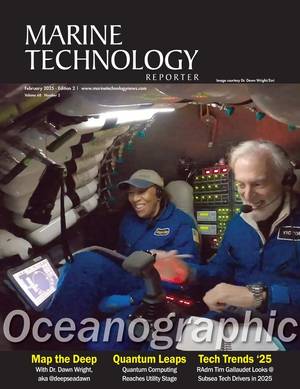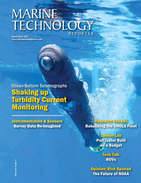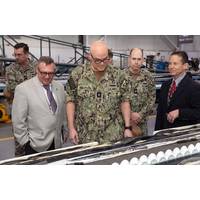
Undersea Warfighting Development Center Leadership Visits NUWC Division Newport
problems and evaluating capabilities in the undersea battle space. This work is performed in collaboration with UWDC’s Submarine Aggressor Squadron (AGGRON).A tour of the Weapons Analysis Facility (WAF) Lab followed. The facility is used for critical tasking in torpedo software development, software integration into torpedo weapon systems, simulation and analysis of both in-water and simulated weapon runs.The group also met with members of the USW Electromagnetic Systems Department, for the latest developments in communications and electronic warfare, as the U.S. Navy’s principal research,
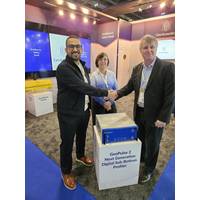
GeoAcoustics Scoops First Major Order for Newly-Launched Sub-Bottom Profiler
.“MER-Subsea is always looking for new technology to bring to our clients across the Middle East and the GeoPulse 2 is a fantastic product that will have great demand across the region,” added Akram Ali, Managing Director of MER-Subsea.GeoAcoustis Launches New Sub-Bottom Profiler and Software Integration CapabilitiesGeoPulse 2 represents a new generation of GeoAcoustics sub-bottom profiling technology. It reaches into deeper waters for the acquisition of essential data for development and operation of offshore wind farms and similar projects.Building upon the legacy of its predecessors, GeoPulse
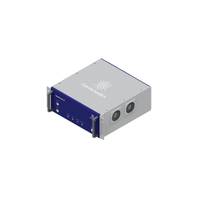
GeoAcoustis Launches New Sub-Bottom Profiler and Software Integration Capabilities
Hydroacoustic sensor technology developer GeoAcoustics has launched the GeoPulse 2 Sub-Bottom Profiler, while also announcing the new integration between GeoPulse Compact and Geo-Suite seismic acquisition software.Designed for diverse applications including pipeline detection, geological surveys, dredging surveys, environmental assessments, and buried object detection, GeoPulse 2 is a highly versatile tool built on 40 years of hydroacoustic technology development by GeoAcoustics.GeoPulse 2 is able to reach into deeper waters for the acquisition of essential data for the development and operation of
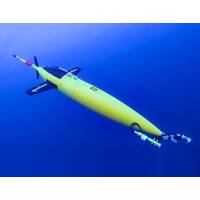
New Tech Frontiers for Ocean Gliders
to mimic machinery noise, and tracked AIS so they could correlate it with acoustic data from the hydrophones and the glider’s location data.Burnett says one of the goals was real-time processing to get real-time information about what’s in the water. This meant signal processing and software integration into the glider, but, with the longer array, also improving the power supply to reduce noise.“We were able to correlate with AIS and could see a cargo vessel passing within 2.45nm of the array,” says Burnett. “We were also able to collect biological data. We observed a pod
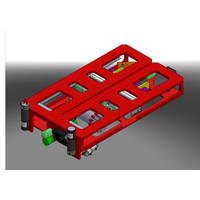
Kraken Scores $7.1 Million of Contracts for Offshore Subsea Inspections
and consumables and will be supported by OOGIRA and project partners Cenovus and Suncor. The project avails of joint engineering efforts from Kraken and its recently acquired subsidiary, PanGeo Subsea, leveraging an existing PanGeo sled design with Kraken SeaVision electronics and significant software integration.Example of SeaVision base inspection tool for water column assets (Image: Kraken)Karl Kenny, Kraken’s President and CEO, said, “Over past few years, the term ‘digital twinning’ has become synonymous with innovation in the offshore energy sector, and vital to corporate

Teledyne Marine Strengthens its Product Management Team
on developing new solutions to continue being ahead, enhance our products and adapt to emerging needs.” Said Tim Jensen, VP of Products & Technology for Teledyne Marine’s Imaging & Instruments team in Europe. “With a number of key developments ongoing related to software integration, signal processing, artificial intelligence and machine learning, this is a great time to strengthen the team by having Pim Kuus joining. We will greatly benefit by having a senior hydrographer of Pim’s caliber joining us and help us bring our multibeam roadmap forward. With a
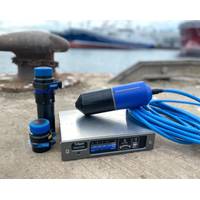
Tritech Launches Updated USBL Tracking System
200 UltraShort Base Line (USBL) system, which is the latest generation of USBL tracking systems from Tritech, designed for small underwater vehicles and diver supporting applications.The updated system offers a number of new features including data transfer interleaved with USBL positioning, software integration into Google Maps, improved magnetic compass accuracy by one degree (1°) and compatibility with the new Micron Battery Modem.The system comprises a subsea Micron Modem or Micron Battery Modem, a surface USBL transducer with integral magnetic compass and pitch/roll sensors, a surface MicronNav

Greensea Expansion Continues with New Space in Vermont
presents a great opportunity to expand within walking distance of our current headquarters”, said Ben Kinnaman, Greensea CEO. “Greensea is growing and we are rapidly expanding within the maritime robotics industry. This new facility gives us additional space for vehicle testing, software integration, and control system development.”Chris Chase, Vice President of Finance and Administration for Greensea, said, “Since March of 2020, we’ve grown our headcount by 50% in our Richmond office. With pandemic restrictions easing, we’re getting more people into the office
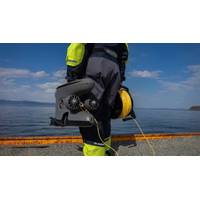
Blueye Robotics Debuts New ROV
can be used as a sensorcarrying platform," said Jørgen Berge, Professor, Dept. Arctic and Marine Biology, University of Tromsø.Some features of the new X3 model include:Three Guest Ports supporting eight different communication protocols for integrating external equipment.Software integration in the Blueye App for grippers and manipulators.Support for navigation and positioning systems such as Waterlinked DVL and GPS, and different sonars from Blue Robotics, Impact Subsea, and Blueprint Subsea.Blueye External-Camera and Blueye External-Lights (up to 10,000 lumens) which can be
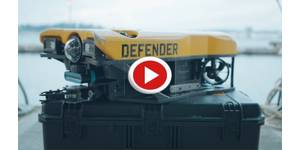
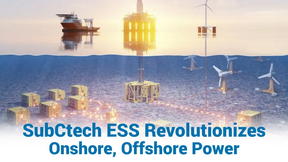
 February 2025
February 2025
